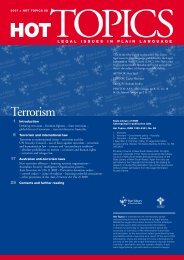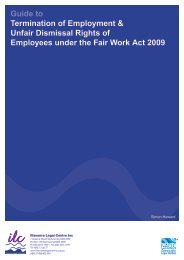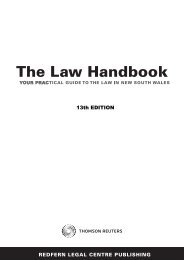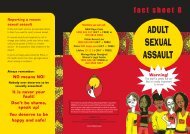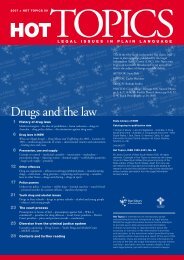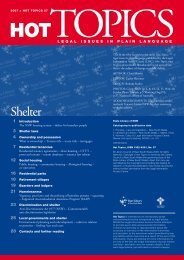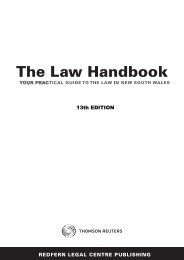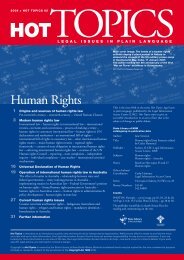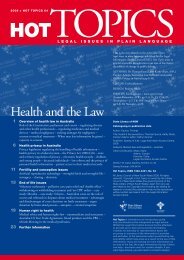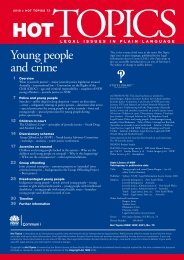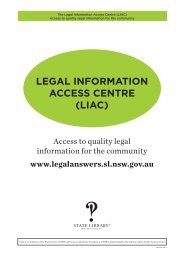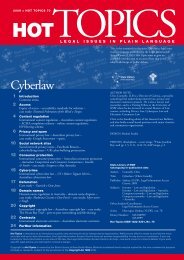Aboriginal people and the law - Legal Information Access Centre
Aboriginal people and the law - Legal Information Access Centre
Aboriginal people and the law - Legal Information Access Centre
Create successful ePaper yourself
Turn your PDF publications into a flip-book with our unique Google optimized e-Paper software.
2 <strong>Aboriginal</strong> <strong>people</strong> <strong>and</strong> <strong>the</strong> <strong>law</strong> 53This fear is a major contributing factor innot reporting domestic violence. It continuesto place <strong>the</strong> responsibility for <strong>the</strong> violenceon women.Communicating with policeThe lack of female <strong>Aboriginal</strong> CommunityLiaison Officers in key NSW police stationshas been consistently identified by Indigenouswomen as a factor in <strong>the</strong> underreportingof domestic violence <strong>and</strong> sexualassault. This is strictly “women’s business”,<strong>and</strong> for Indigenous women to talk to menabout such intimate <strong>and</strong> traumatic issues isboth embarrassing <strong>and</strong> shameful. Whilst<strong>the</strong>re are some (mostly non-Indigenous)female Domestic Violence liaison officers<strong>and</strong> police officers, <strong>the</strong> cultural barrier maystill remain.[2.260] <strong>Access</strong>ing <strong>the</strong> family<strong>law</strong> systemThe experience of <strong>the</strong> legal system for manyIndigenous women has been a negative,confusing <strong>and</strong> disempowering one. Manywomen choose not to engage with <strong>the</strong>family <strong>law</strong> system as <strong>the</strong>y are concernedthat <strong>the</strong> Department of Family <strong>and</strong> CommunityServices will become involved <strong>and</strong> take<strong>the</strong>ir children away. However, using <strong>the</strong>family <strong>law</strong> system, including family disputeresolution <strong>and</strong> <strong>the</strong> courts, can be a usefulway to take positive steps to make safearrangements for children without Family<strong>and</strong> Community Services involvement. Culturallyappropriate services are crucial toenable this.The ability of Indigenous women to access<strong>the</strong> legal system without professional <strong>and</strong>ongoing holistic support is limited. SomeIndigenous women have had violence inflictedon <strong>the</strong>m by more than oneperpetrator, as children <strong>and</strong> adults. Thesewomen are particularly vulnerable <strong>and</strong>many have moderate to severe posttraumaticstress <strong>and</strong> associated psychologicalconditions of varying degrees (egdepression, severe anxiety, personalitydisorders). Indigenous women may also bedisadvantaged by generally having low literacylevels <strong>and</strong> having significant social,economic, geographic <strong>and</strong> culturaldisadvantage. Many women have o<strong>the</strong>rfamily members experiencing similardisadvantage, as well as also being victimsof sexual assault <strong>and</strong>/or family violence.Family dispute resolution (FDR) servicesare located in large regional centres, however<strong>the</strong>y are not in most small towns noranywhere close to many <strong>Aboriginal</strong>communities. The lack of private <strong>and</strong> publictransport <strong>and</strong> costs of travel <strong>and</strong> accommodationmean attending <strong>the</strong>se services isdifficult. FDR services are very much mainstreamservices which are focused on <strong>the</strong>nuclear family model <strong>and</strong> non-Indigenousfamily raising practices.The family <strong>law</strong> courts have developed aReconciliation Action Plan as part of astrategy to make <strong>the</strong> courts more accessible.<strong>Access</strong> to informationGiven <strong>the</strong> levels of domestic violence <strong>and</strong>sexual assault Indigenous womenexperience, information about <strong>the</strong> VictimsSupport Scheme is also essential. Relativelyfew Indigenous women are aware of thisscheme <strong>and</strong> <strong>the</strong>ir right to apply for counselling<strong>and</strong> financial assistance as victims ofviolent crime. Victims Services has an <strong>Aboriginal</strong>Contact Line 1800 019 123.See also chapter 42, Victims Support <strong>and</strong> chapter 21,Domestic violence.[2.270] <strong>Legal</strong> services forIndigenous womenWirringa Baiya <strong>Aboriginal</strong> Women’s <strong>Legal</strong><strong>Centre</strong> was established in 1996 <strong>and</strong> is inMarrickville in Sydney. Wirringa Baiyameans black women speak. It providestelephone advice about domestic violence,sexual assault, care <strong>and</strong> protection <strong>and</strong>custody matters. It can provide legal representationor refer women to o<strong>the</strong>rrepresentation.Women’s <strong>Legal</strong> Services, a mainstreamservice provider, established an IndigenousWomen’s <strong>Legal</strong> Program in 1997. It providesa state-wide service including a “1800”advice line for family <strong>and</strong> civil matters,



